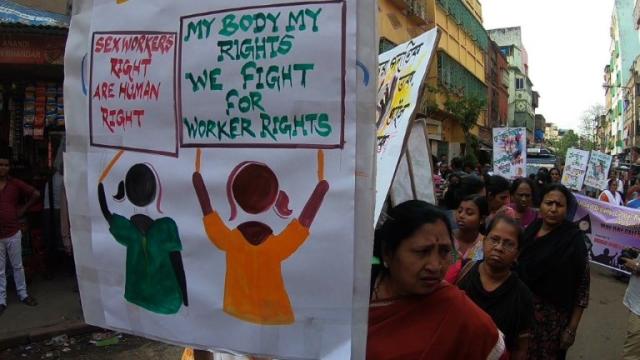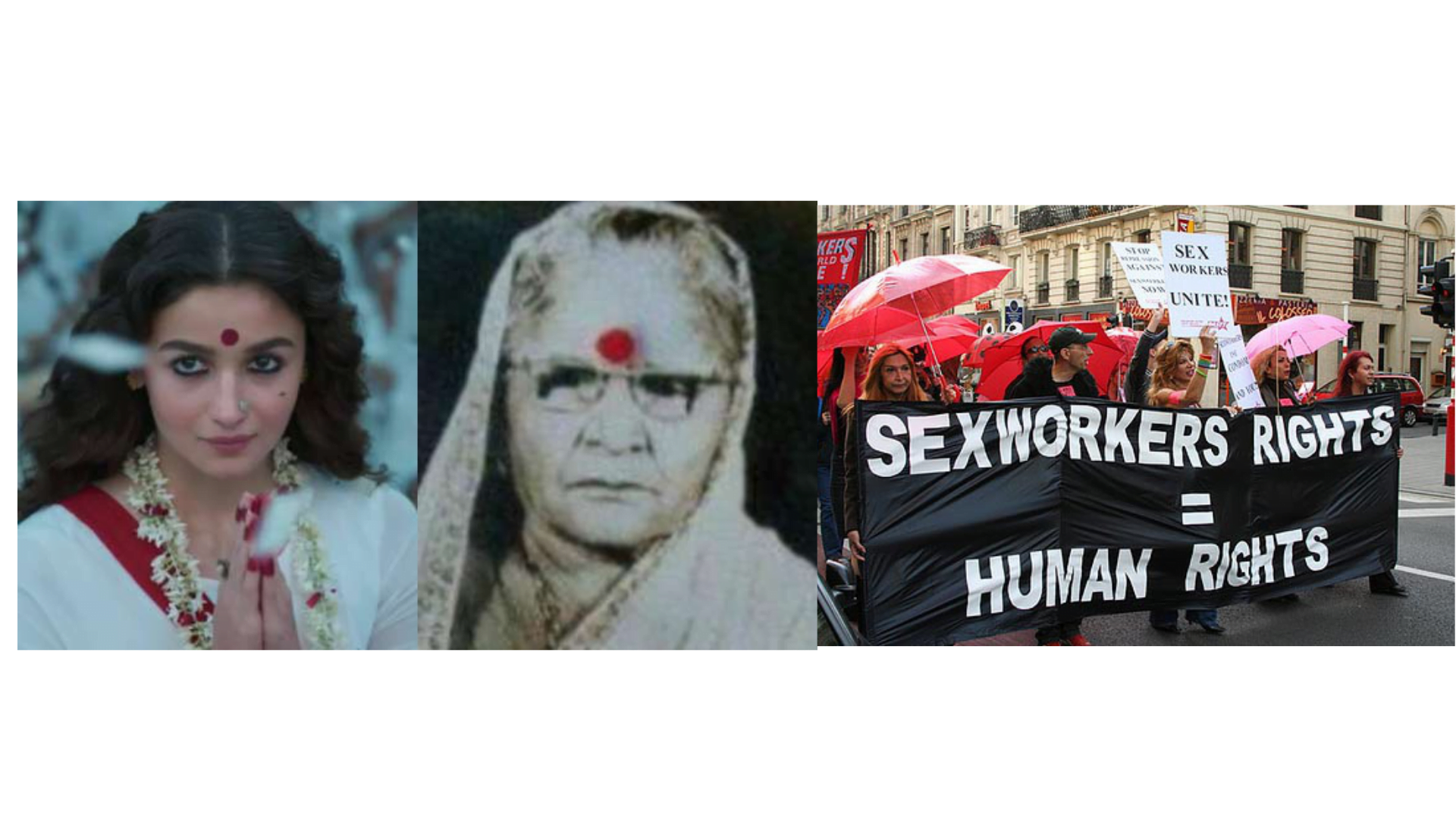Sanjay Leela Bhansali’s movie Gangubai Khathiawadi is an adaptation from the chapter of Mafia Queens of Mumbai, written by Hussain Zaidi. It portrays the life journey of a naïve girl Ganga, who belonged to an upper-class society and was the daughter of a barrister but ended up as Gangu, a prostitute in the red-light district of Kamathipura. Eventually, she rose to be the powerful madam of her brothel home and then the leader for all the prostitutes in her area, who would fearlessly fight for the rights of her fellow sex workers. Gangu’s life was far from being easy. She was a victim of human trafficking and was forced into prostitution. However, she decided to accept her fate and make the best of it. She delivered a historic speech that emphasised on the importance of sex work in society, which was impressive enough to earn her a meeting with Prime Minister Nehru.
The movie reiterated the common notion regarding sex workers in India and across the world — that they are either the victims of human trafficking and forced into it or choose this profession to escape the perils of poverty. However, at the same time, it makes one inquisitive regarding whether the situation of sex workers – in terms of their fundamental, socio-political, and labour rights have changed since then.
Also read: Why Is Sex Work Not Seen As Work? – Part 1

While legally, there have existed statutes for the prevention of human trafficking and child labour in sex work. These include The Immoral Traffic (Prevention) Act, 1956 and Section 372 and Section 373 of the Indian Penal Code, which existed even during the times of Gangubai, and more recently, the Section 81 of the Juvenile Justice (Care and Protection of Children) Act, 2015, — these respective issues unfortunately still exist.
Sex workers have to face discrimination in society to the extent that the consequences of the same put their life in danger. For example, in the movie, when Gangu was seriously injured and taken to the hospital, she was moved to a dingy storeroom instead of the general ward by the nurses. In reality, too, the sex workers face exploitation and discrimination when it comes to health care.
When it comes to the issue of securing labour rights, the main cause of the problem lies in the conundrum that exists regarding prostitution — that while it is not illegal, it has not been explicitly legalised either. India has followed a mix of two methods as its policy towards sex work. First is the forcible removal of sex workers and restraints on entry into sex work. Here it is unclear if such a policy stems from the point of concern for the welfare of sex workers or a moral perspective that looks down on sex work in general.
The second is to reduce the level of exploitation in the industry by legalising sex work and protecting the political rights as well as civil liberties of the workers while trying to curb trafficking and exploitation at the hands of brothel owners. Thus, viewing this $8.4 billion industry as either exploitative or immoral and coming up with legal tools based on rehabilitation and addressing these specific problems ends up depriving the sex workers of their labour rights.

The Immoral Traffic (Prevention) Act does not criminalise prostitution per se but acts revolving around it, such as brothel-keeping, living on the earnings of prostitutes, or procuring a person for the sake of prostitution. On the other hand, The Contagious Diseases Act of 1984 somewhat confers a legal status on sex work while laying down mandatory testing rules for sex workers to check for venereal disease and restricting their movement and practice to specifically allocated areas. These statutes are often used to further exploit sex workers rather than achieve the aims and objectives they were enacted for.
The police often take bribes by filing more cases under the Immoral Traffic Act against the victims than brothel keepers. The problem regarding police bribery was depicted in the movie as well when the police were shown to visit the brothels often to collect their regular payment of bribes. On the other hand, protective homes created by the Government often become second brothels and do not function efficiently.
Sex workers have to face discrimination in society to the extent that the consequences of the same put their life in danger. For example, in the movie, when Gangu was seriously injured and taken to the hospital, she was moved to a dingy storeroom instead of the general ward by the nurses. In reality, too, the sex workers face exploitation and discrimination when it comes to health care. This has only worsened after the HIV/AIDS epidemic, where doctors ask them to get checked for the same without even first listening to their problems. Their right to information, privacy, and security is breached as the health workers take their blood sample without even explaining to them the purpose for the same. Moreover, as depicted in the movie accurately, in reality, too the income of sex workers, especially the minor ones are appropriated by brothel owners and traffickers.
Also read: Bollywood & The Girlbossification Of The Sex Worker
Perhaps the most important part of the movie that must be highlighted is when the brothel owner lets Gangu be brutally assaulted by a man. Gangu had to later take the help of an underworld don to protect herself from the man, which eventually ended up giving the strong message to all the men that no man had the right to assault the sex workers in the red light area, and if they did so, they would face extralegal consequences. Hence, it is important for there to be in place legal protection for sex workers to help them in such dire situations. The nature of their work in no way means that another individual has the right to violate their body. In-State of Maharashtra v. Madhukar Narayan Mardikar, the Supreme Court held that:
“…even a woman of easy virtue is entitled to privacy and no one can invade her privacy as and when he likes. So also, it is not open to any and every person to violate her person as and when he wishes. She is entitled to protect her person if there is an attempt to violate it against her wish. She is equally entitled to the protection of the law. Therefore, merely because she is a woman of easy virtue, her evidence cannot be thrown overboard.”
In Shushil v. State of U.P., the Allahabad High Court had held that there “is no rule of law that the statement of the prostitute cannot be believed” in case of a report of rape. She is entitled to fundamental, moral, and social rights and has a say in who she wants to permit for sexual intercourse, and nobody can do so by exerting compulsion or threat. Hence, even if the nature of work for a sex worker is extremely intimate, it is work nonetheless, and she must be entitled to adequate protection and safety while doing her work.
Two popular forums that have been actively working towards destigmatising sex work and fighting for the labour rights of sex workers are DMSC (Darbar Mahila Samanwaya Committee) in West Bengal, which comprises 40,000 sex workers and SANGRAM (Sampada Grameen Mahila Sanstha). Both of these forums started to tackle the issue of the HIV epidemic amongst the sex workers and hence, spread awareness regarding the same and encourage the use of condoms. Apart from this, both the forums stand for the fact that sex work and trafficking are not synonymous and can be a choice an adult woman makes to earn a livelihood, and thus adult sex work should be legalised. Just like the workers of the other industries, sex workers too, have the right to demand better working conditions. The forums encourage the unionisation of sex workers to achieve their respective goals. In fact, DMSC has organised the Calcutta Sex Worker Union, which has had beneficial effects as the union works towards the articulation of the goals of sex workers gaining literacy, and spreading the message of forming a community where they can unitedly fight for their liberty, dignity, justice and a life of respect which is free from discrimination.
Their right to information, privacy, and security is breached as the health workers take their blood sample without even explaining to them the purpose for the same. Moreover, as depicted in the movie accurately, in reality, too the income of sex workers, especially the minor ones are appropriated by brothel owners and traffickers.

Hence, it is a reality that due to the stigmatisation and lack of proper legalisation of sex work, the sex workers are not entitled to adequate labour rights. Even the rights they gather from the various statutes, and the constitution are not actualised. This leads to their poor financial conditions, high level of illiteracy, lack of health care and other benefits, and harassment by law authorities. Thus, they are made to work under conditions that are nothing less than slavery. But as Gangubai said, just like any other trade or profession, the sex workers, too, have the right to equality and a life of respect. The professionals in whose industry intellect is required, receive payment in exchange for providing their intellect to their client or employer.
When it comes to sex work, it is the physical body that is required to perform the job, and hence, the sex workers put their bodies to use to earn an income, and while doing so, they hold no discrimination against their clients. Thus, it is their right to not be discriminated against by others as they serve an important purpose in society. Sexual pleasure is a biological need and intercourse is not merely meant for procreation. While this speech by Gangu is rather bold, it is the truth. And like the workers of any other industry, sex workers too must get access to labour rights.
Afshaa Hakim(she/her) is currently pursuing a degree in law and is the founder of Friends of the Innocent, an NGO based out of Calcutta which aims to provide legal aid to the underprivileged sections of the society. She believes in intersectional feminism and is passionate about human rights, gender studies and personal laws. Afshaa can be found on Instagram.
Featured Image Source: DNA India, Samuel Centre For Social Connectedness




